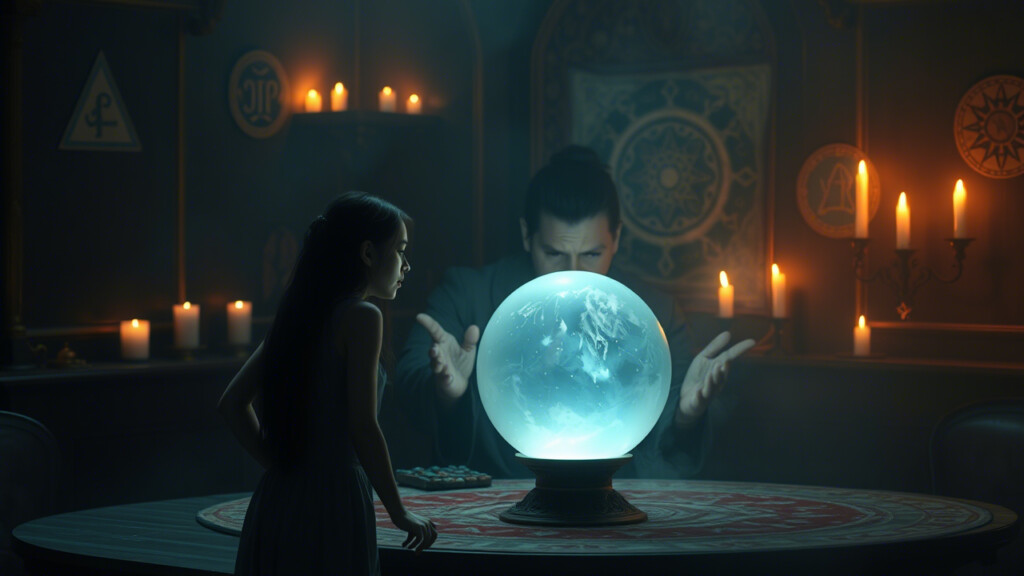Have you ever faced an important decision and felt completely lost? When work isn’t going well, love life is full of obstacles, or simply out of curiosity about the coming year, many people turn to fortune telling for guidance or at least a sense of reassurance.

From Tarot readings, palmistry, astrology, feng shui, to numerology, every culture has its own way of “seeing” the future. But does fortune telling truly help, or is it just a psychological comfort?
Why Do Both Asians and Westerners Like Fortune Telling?
No matter the culture, fortune telling has always had a mysterious appeal. In Asia, people often seek fortune tellers to find harmony in life, believing in destiny and spiritual forces. In the West, tools like astrology, Tarot, and personality assessment systems such as Enneagram or MBTI serve as a way to explore oneself and navigate the future.
So, what lies behind this attraction? Psychology offers some explanations. One of them is the Confirmation Bias, a cognitive bias first studied by psychologist Peter Wason in the 1960s and later analyzed in depth by Ray Nickerson (1998). This bias makes people selectively seek, remember, and trust information that aligns with their existing beliefs. When given a prediction—no matter how vague—people unconsciously look for events that confirm it. For example, if a fortune teller says someone is ‘charming and attracts admirers,’ that person may start noticing compliments and glances of admiration while ignoring opposing signals.
Another psychological factor is the ‘Barnum Effect,’ identified by psychologist Bertram Forer through an experiment in 1948. This effect describes how people tend to believe vague personality descriptions are highly accurate and uniquely tailored to them.
Psychologist Bertram Forer conducted an experiment in 1948. He gave students a personality test and later handed each of them a “personalized analysis.” In reality, all students received the same generic description. Surprisingly, most rated the analysis as highly accurate. This demonstrates how fortune tellers often make vague statements that can fit almost anyone. For instance: “You are kind-hearted but sometimes impatient.”
Additionally, the fear of losing control plays a significant role. Life is unpredictable, and when faced with uncertainty, people naturally seek explanations—even irrational ones. Fortune telling provides a sense of control over destiny. One person shared: “I don’t fully believe in fortune telling, but whenever I face difficulties, I go for a reading. Hearing the fortune teller say that ‘a benefactor will soon appear’ gives me peace of mind.”
Buddhist Perspective – Actions Matter More Than Fate
The Dhammapada says: “The mind is the forerunner of all things, the mind is their chief, and they are mind-made” (Twin Verses, Verse 1). This means that one’s thoughts, words, and actions in the present shape the future. If a person’s business is failing, can a fortune teller truly turn things around? Or must they reevaluate their strategy, analyze the market, and improve their financial management?

From a scientific standpoint, decisions based on data, research, and critical thinking are always more effective than relying on vague predictions. Success and failure are not dictated by “bad luck” or “planetary alignments” but by real actions taken by each individual.
So, Should You Go for a Fortune Telling Session?
Perhaps a better question is: What do you expect from it?
If fortune telling is merely for entertainment, self-reflection, or gaining new perspectives, then there’s no harm in it. Some methods, like astrology or numerology, may even help individuals recognize their strengths.
Astrological charts are based on birth time, date, month, and year to create a map of one’s destiny, believing that celestial influences shape a person’s life path. Numerology, on the other hand, analyzes numbers derived from birth dates and names, suggesting that each number carries its own energetic vibration that impacts personality and life direction. These methods may offer insights into strengths, weaknesses, and personal tendencies.
However, placing too much faith in love predictions, financial forecasts, or prophecies about the future could mean letting someone else decide your fate.
The future, after all, is something each person must shape for themselves.
